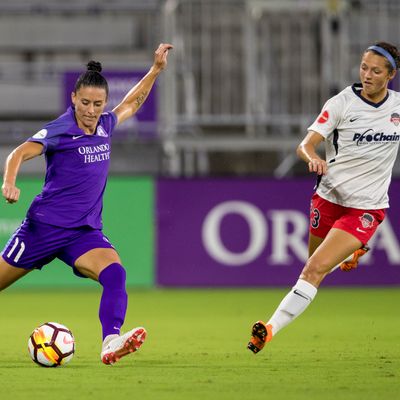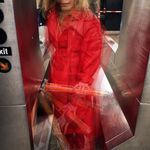
When the world’s top women’s soccer league kicks off its season this Saturday, only eight of the league’s nine teams will take to the pitch. The Orlando Pride, whose home city is gearing up to host the MLS is Back tournament and the balance of the NBA season this summer, will sit this season out after some players reportedly visited Florida’s open bars, caught COVID-19, and gave it to their teammates.
Originally scheduled to stretch from April to October, the National Women’s Soccer League’s eighth season, like the rest of the world, was halted in March due to COVID-19. At the end of May, in a bold play to capture post-lockdown eyeballs and capitalize on increased interest in women’s soccer after the U.S. won the world cup last summer, the NWSL was the first in team sports to announce a planned return. In partnership with the NWSL Players Association, which demanded full pre-pandemic salary levels (including for players who opt out of the tournament for any reason) and and health coverage for the year, the league has crammed its typical season into a one-month tournament in Utah. That event will hinge on players’ ability to adhere to a strict set of safety protocols, including mask wearing (except while eating and exercising), no travel outside the player village, and no visitors for the duration of the tournament. The Utah Royals will host the tournament and, owing to a 15-physician task force, implement an elaborate testing protocol and plan for contact tracing if positive tests occur.
Last Thursday, before teams even departed for Utah, the league announced that an unnamed player on an unnamed team had tested positive. At the time, no changes to the tournament were deemed necessary and no one else tested positive. On Monday, The Athletic’s Meg Linehan reported that it was an Orlando Pride player and the positive test was only found due to the Pride conducting testing that exceeded the NWSL’s mandated weekly tests. Sources told Linehan that multiple players visited Orlando bars and the team added an additional round of tests after it found out, leading to the first positive test. The player was quickly isolated. On Monday, the Orlando Pride announced that six players and four staff members tested positive and they were withdrawing from the tournament. According to the team’s doctor, “the guidelines and process that are put in place, including the important protocols and timelines for contact tracing, make it logistically impossible for the club to participate in the Challenge Cup in Utah.”
After it was reported that players’ personal decisions caused the Pride to drop out, a predictable flurry of speculation and amateur investigation spilled out online. In response, the team’s captain and Central Florida local Ashlyn Harris put out a statement, “To the fans … My ask is that you stop digging for things that cannot change the situation at this point. My hope is you start checking in and supporting these players and the staff. We could use some positivity and love. Thank you. Stay Safe. -Cap”
It is unclear how explicit the rules were for players to not go out once Florida began reopening. The league has emphasized that teams should adhere to local regulations but in some cases has required players to go beyond what local officials require. The NWSL allowed teams to resume individual training at team facilities on May 6, with players adhering to local guidelines and undergoing daily symptom screenings. Any coach present adhered to social distancing, and the training was limited to outdoor facilities. Small-group training began on May 26, and teams were allowed to train as a full group beginning May 30.
Of all the teams in the league, the Orlando Pride is undoubtedly the most star-stacked squad. The team is home to World Cup winners Alex Morgan, Emily Sonnet, Sydney Leroux Dwyer, and power couple Ali Krieger and Ashlyn Harris; members of national teams from Australia, Canada, New Zealand, and Brazil; including the mononymous Marta, regarded as the greatest women’s soccer player of all time. Most of these stars are older than 30, which makes missing an entire season at this late stage of their career all the more devastating.
Players have not been shy about expressing their frustration. In an Instagram story posted from a drive-through testing location, Harris shared that she was feeling “disappointed, sad, scared, frustrated and all of the things in between.” On Twitter, Leroux Dwyer described her heartbreak in missing what was going to be her first full season since returning from the birth of her second child and subtly called out her teammates: “The majority of our team & staff worked our asses off to put us in the best position to play the game we love again.” She later dropped the subtlety: “One thing I’m not going to stay quiet about is this. This is completely unfair to put on a coach and our staff. Unfortunately, WE are the reason this ship sunk. Period.” To Leroux Dwyer’s first comment, U.S. Soccer legend Julie Foudy responded, “Ahhh. I’m also heartbroken for you. A great reminder of how the selfishness of a few affect the larger community. LISTEN UP AMERICA. Or this ain’t going away.”
While the anonymous bar-hoppers are being called out for shirking their responsibility to their teammates, they might be forgiven if they looked to the state’s leadership for direction on how to behave during the crisis. For months, it has seemed like Florida might escape with minimal devastation, despite Governor Ron DeSantis’s comparatively late stay-at-home order and early reopening. Today, Florida is one of many states across the Sun Belt seeing rapid increases in coronavirus cases as states in the Northeast seem to have flattened the curve after being hit hard in April. On Wednesday, the state had the highest number of new cases in one day, and DeSantis has made clear he will not consider instituting another stay-at-home order. In Orlando, owing to DeSantis’s reopening plan, bars opened on June 5 at 50 percent capacity and with no mask requirement for customers. The county mayor mandated that face masks be worn in public just last Saturday. Now several bars and restaurants are voluntarily shuttering weeks after reopening, because staff and customers are testing positive for the virus.
For the Orlando Pride, the carefully constructed environment meant to ensure that players could train at the level needed to compete in an incredibly demanding tournament after months away from the field proved not careful enough to control the spread of the virus. On Monday, the league scrambled to announce a schedule for an eight-team tournament, but not before some of the league’s stars announced they were also staying home due to coronavirus concerns. Since the NWSL’s announcement, the NBA made official its plans to restart the season at the end of July in Orlando. The MLS will start on July 8, also in Orlando. The WNBA will also play in Florida. With just nine teams, the NWSL is a comparatively small league, and its hurdles getting to kickoff do not bode well for the prospect of hundreds of athletes, coaches, health staff, caterers, and media descending on a state with skyrocketing positive cases.





























